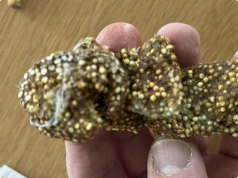Your thyroid gland may be small — about the size of a butterfly at the base of your neck — but it plays a huge role in your overall health.
It controls your metabolism, energy levels, mood, weight, and hormone balance.
When your thyroid isn’t functioning properly — whether it’s underactive (hypothyroidism) or overactive (hyperthyroidism) — every system in your body feels the impact.
While medical treatment is essential for thyroid disorders, your diet can either support healing — or make things worse.
Certain foods can interfere with thyroid function, disrupt hormone production, or worsen symptoms.
Here are 6 types of foods that can negatively affect your thyroid — and what to do instead.
❌ 1. Raw Goitrogenic Vegetables
The Hidden Thyroid Blockers
Foods to watch:
- Raw kale, spinach, broccoli, cabbage, Brussels sprouts, cauliflower, bok choy
These cruciferous vegetables contain goitrogens — compounds that can interfere with iodine uptake in the thyroid gland.
Iodine is essential for producing thyroid hormones (T3 and T4).
When goitrogens block iodine, it can worsen hypothyroidism and lead to goiter (thyroid enlargement).
✅ The good news:
Cooking deactivates most goitrogens.
Steaming or boiling cruciferous veggies reduces their goitrogenic activity by up to 90%.
🟢 Smart tip:
Enjoy these nutrient-rich vegetables — but cook them if you have hypothyroidism.
Moderate raw intake if you’re healthy and eat a balanced diet.
❌ 2. Soy Products (Especially Unfermented)
The Hormone Mimicker
Foods to watch:
- Soy milk, tofu, edamame, soy protein isolate, soy sauce
Soy contains isoflavones (like genistein), which are phytoestrogens — plant compounds that can:
- Block thyroid peroxidase (TPO), an enzyme needed to make thyroid hormones
- Interfere with thyroid medication absorption
- Increase risk of hypothyroidism, especially in people with low iodine intake
This is especially concerning for:
- People with Hashimoto’s thyroiditis
- Those on levothyroxine (wait 4 hours after taking medication to consume soy)
🟢 Smart tip:
Fermented soy (like miso, tempeh, natto) is less problematic in moderation.
Limit unfermented soy if you have thyroid issues.
❌ 3. Gluten
The Autoimmune Trigger
Foods to watch:
- Bread, pasta, cereals, baked goods, beer (anything with wheat, barley, rye)
For people with Hashimoto’s (the most common cause of hypothyroidism), gluten can be a major trigger.
Why?
Gluten’s protein, gliadin, looks similar to thyroid tissue.
In sensitive individuals, the immune system may attack the thyroid in a case of molecular mimicry.
Studies show a strong link between celiac disease and autoimmune thyroid disease.
🟢 Smart tip:
Even if you’re not celiac, a gluten-free trial (for 4–6 weeks) may reduce inflammation and improve thyroid antibodies.
❌ 4. Refined Sugar & Processed Foods
The Inflammation Amplifier
Foods to watch:
- Candy, soda, pastries, white bread, packaged snacks
High sugar intake fuels chronic inflammation — a key driver of autoimmune flare-ups, including Hashimoto’s.
It also:
- Spikes insulin, which can disrupt hormone balance
- Weakens the immune system
- Contributes to weight gain — a common struggle with hypothyroidism
🟢 Smart tip:
Choose whole, low-glycemic foods like berries, nuts, and vegetables.
Reduce added sugars to under 25g per day.
❌ 5. Excess Caffeine
The Adrenal & Thyroid Stressor
Foods to watch:
- Coffee, energy drinks, strong black tea
While moderate caffeine is fine for most, excess intake can:
- Worsen anxiety and insomnia — common in hyperthyroidism
- Disrupt sleep and adrenal health — which affects thyroid function
- Interfere with thyroid medication absorption (wait at least 60 minutes after taking meds)
🟢 Smart tip:
Limit to 1–2 cups of coffee per day, and avoid drinking it with breakfast if you take thyroid meds.
❌ 6. Processed Vegetable Oils & Trans Fats
The Inflammatory Fats
Foods to watch:
- Margarine, fried foods, packaged snacks, fast food
Oils like soybean, corn, and sunflower oil are high in omega-6 fatty acids, which can promote inflammation when consumed in excess.
Trans fats (partially hydrogenated oils) are even worse — they:
- Increase inflammatory markers
- Damage cellular function
- May worsen autoimmune responses
🟢 Smart tip:
Switch to anti-inflammatory fats:
- Extra virgin olive oil
- Coconut oil
- Avocado oil
- Omega-3s from fatty fish, flaxseeds, and walnuts
✅ Foods That Support Thyroid Health
While avoiding the above, focus on:
- Iodine-rich foods: Seaweed, fish, eggs, dairy
- Selenium: Brazil nuts (1–2 per day), tuna, sardines
- Zinc: Pumpkin seeds, beef, chickpeas
- Iron: Spinach, lentils, red meat
- Vitamin D: Sunlight, fatty fish, fortified foods
- Healthy fats: Avocados, nuts, olive oil
🩺 Final Thoughts: Your Thyroid Is Listening to Your Plate
You can’t cure a thyroid condition with diet alone — but you can make it worse with the wrong foods.
If you have hypothyroidism, hyperthyroidism, or an autoimmune thyroid disorder, what you eat matters — deeply.
By reducing or eliminating these 6 thyroid-disrupting foods, you’re not just eating healthier —
👉 You’re creating a calmer, more balanced environment for your thyroid to heal.
So next time you reach for that soy latte or raw kale smoothie…
Pause.
Ask yourself:
Is this helping my thyroid — or hurting it?
Because real healing starts not with a pill, but with your plate.
Small changes. Big impact. Your thyroid will thank you.






